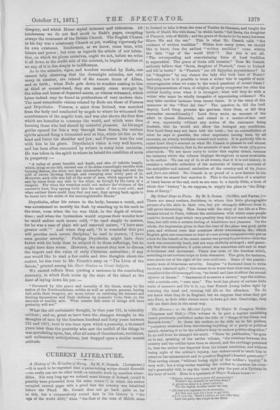CURRENT LITERATURE.
A History of the Kingdom of Kerry. By Id. F. Cusack. (Longman.) —It is much to be regretted that a pains-taking writer should discredit —we really can use no other word—a valuable work by manifest absur- dities. Not very long ago we noticed some history of Ireland, (could it possibly have proceeded from the same source ?) in which the author occupied several pages with a proof that the country was inhabited before the Flood. Mr. Cusack does not go back quite so far as this, but a comparatively recent date in his history is " the age of the world 8500," when " the fleet of the sons of Milidh came to Ireland to take it from the sons of Tuatha de Danaans, and fought the battle of Sliabh Mis with them," in which battle " fell Soots., the daughter of Pharaoh, wife of Milidh ; •and the grave of Seota is (to be seen) between Sliove Mis and the sea." This is what Mr. Cusaok calls " the evidence of written tradition." Within how many years, we should like to know, does the earliest " written tradition " come within the date "age of the world 3500 "? But this is not ell. " The corresponding and overwhelming force of local tradition is superadded. The grave of Seats still remains." Does Mr. Cusack seriously believe that "Scots, daughter of Pharaoh," came to Ireland and fell in battle ? Is " Pharaoh " our old Egyptian acquaintance ? Is his "daughter" by any chance the lady who took care of Moses? Seriously, how is it possible to trust a writer who is capable of such extravagancies when we come to the vexed questions of recent times ? The prepossessions of race, of religion, of party overpower too often the critical faculty, even when it is strongest ; what will they do with a writer who must be wholly incapable of appreciating evidence? We may take another instance from recent times. It is the story of the massacre at the " Fort del Ore." The question is, did the lord deputy, Lord Grey, promise tyre garrison their lives, or did they surrender unconditionally ? Lord Grey wrote an account of the affair to Queen Elizabeth, and stated in a matter-of-fact sort of way, apparently without any notion of the statement being doubted, that he would not allow the besieged any conditions. Now Lord Grey may not have told the truth ; but no contradiction of what he says is possible, the other negotiator having been, by all accounts, an utterly worthless coward and traitor. It is perfectly idle to reject Lord Grey's account on what Mr. Cusack is pleased to call almost contemporary evidence, that is, the accounts of men who wrote fifty years afterwards. We are more sorry to notice this capital defect, because the industry which the volume displays throughout is most creditable to its author. We can say of it, at all events, that if it is not history, it contains a valuable collection of the materials of history ; accounts of the antiquities and natural curiosities of the country and of its fauna and flora are added. Mr. Cusack is so proud of a now feature in his book that we cannot but mention it. This is the insertion of a number of blank leaves at the end, such ae are seen in a family Bible, a book of which this " history " is, we suppose, to supply the place in "the King- dom of Kerry."


































 Previous page
Previous page